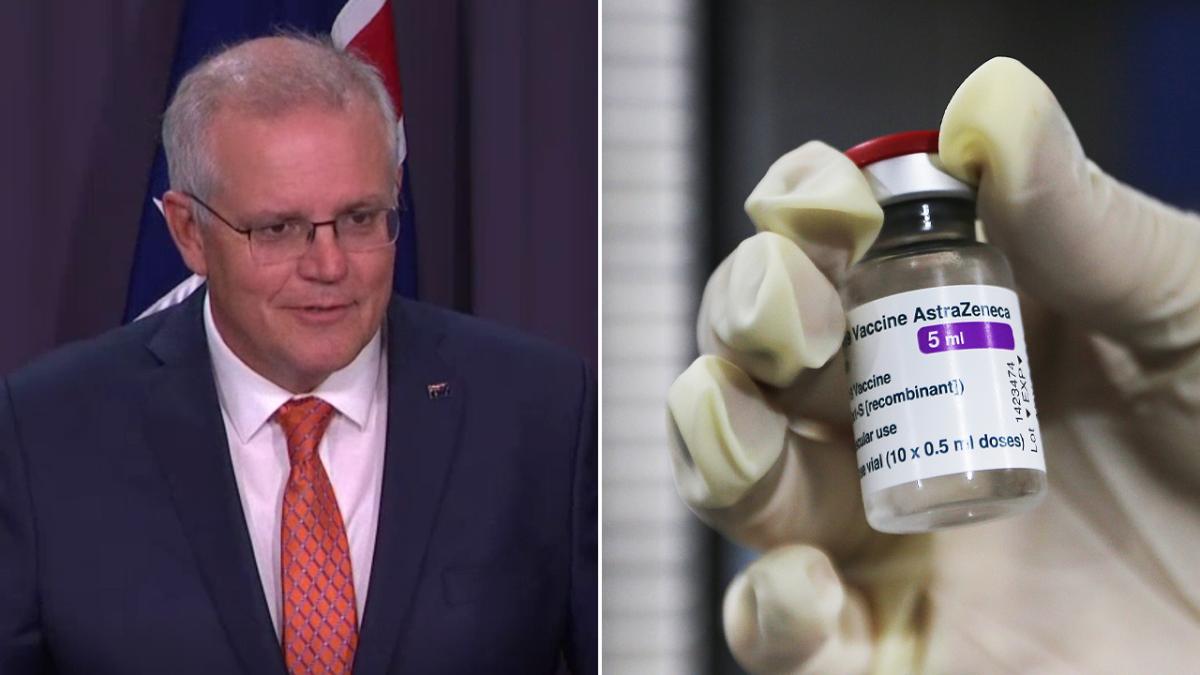
At a dramatic press conference on Thursday night, Prime Minister Scott Morrison announced that the AstraZeneca vaccine – which, until now, was supposed to be Australia’s vaccine of choice – would no longer be recommended for people under 50.
The news came after several people who had received the AstraZeneca jab ended up with an extremely rare and potentially-fatal blood clotting disorder. Not good at all.
Health authorities are still torn about the link between the vaccine and blood clots, but the Australian government (like many other countries) has decided to reduce the use of the vaccine out of an “abundance of caution”.
“I think we have to take the time to assess the implications for the program,” Morrison said on Thursday night.
“But it won’t stop the work that we’re doing in rolling out the vaccination program right now with the doses that we have, particularly from Pfizer, but also rolling out from AstraZeneca, which are predominantly for older Australians above 50 in phases 1a and 1b.”
Here’s how serious the situation is, why young people are at the centre of the issue, and what the road ahead looks like.
Clot Morrison
— Dee Madigan (@deemadigan) April 8, 2021
What do the experts reckon?
The blood clotting syndrome in question is cerebral venous sinus thrombosis (CVST), which can cause headaches, seizures, stroke-like symptoms and can even be fatal.
Out of over 34 million doses of the AstraZeneca vaccine given in the European Economic Area as of April 4, there have been just 169 cases of CVST reported. In Australia, just one case of blood clotting following the AstraZeneca jab has been reported so far.
“EMA is reminding healthcare professionals and people receiving the vaccine to remain aware of the possibility of very rare cases of blood clots combined with low levels of blood platelets occurring within two weeks of vaccination,” the EU’s top medicine approval agency said in a statement.
“So far, most of the cases reported have occurred in women under 60 years of age within two weeks of vaccination. Based on the currently available evidence, specific risk factors have not been confirmed.”
While quite a few countries around the world have suspended the vaccine for young people, it definitely hasn’t been written off altogether.
Department of Health Secretary Professor Brendan Murphy is standing by the AstraZeneca vaccine for people over 50, saying the risk of any side-effects is “extraordinarily low”.
“I’ve had my first dose, I’ll have my second dose,” he said.
The experts’ conclusion thus far is clear: the benefits of the AstraZeneca vaccine outweigh the risks.
It makes total sense when you realise how miniscule the risk of blood clots is compared to the risk of contracting COVID-19 with no vaccine.
Yes, government is saying Pfizer is preferred to Astrazeneca for under 50’s.
But we cannot overstate that Astrazeneca, unless you have a medical contraindication, is much, much, much preferred to getting #COVID19aus.— Dr Vyom Sharma (@drvyom) April 8, 2021
Why are only young people discouraged from getting the AstraZeneca shot?
The reason Australia is no longer recommending the AstraZeneca vaccine for under-50s is because most of the reported cases of CVST have occurred in young people.
“The ones we’ve seen, there’s definitely a tendency for it to be in younger people, and we’re still working out what the mechanism might be for why this is occurring, but it most likely seems to be an immune reaction probably to the adnovirus of the AstraZeneca vaccine,” Australia’s Chief Medical Officer Paul Kelly said on Thursday night.
“So, younger people, we know, have a more robust immune system and are likely to have this sort of reaction.
“So, the 50 cut-off is based on what we’ve seen in these events so far – more common in younger people, less common in older people. We know older people are at higher risk of COVID.”
It’s also important to note that people who’ve hade their first dose of the AstraZenaca vaccine without any side effects can safely go on to have their second and final dose. Nevertheless, there are relatively few young Aussies in that category so far because of the way the vaccine’s being prioritised for older people.
If you have had the AstraZeneca jab you are a boomer now. No exceptions. The pm said so.
— Matilda Boseley (@MatildaBoseley) April 8, 2021
What are the odds?
According to the current data, the odds of having blood clots after getting the AstraZeneca vaccine are extremely low. That’s why it still has the all-clear for older people who’re more at risk of COVID-19.
In fact, people who take the birth control pill are at a much greater risk of getting blood clots, and yet, there’s very little public hubbub about that.
One in 1,000 women who take the pill get blood clots, according to some estimates. Compare that to the 1 in 250,000 AstraZeneca shot recipients who have reported blood clots.
Maybe that’s a sign we need to more seriously scrutinise medicine designed for only half of the population – women and other people who menstruate.
But it’s also a sign not to freak out at the AstraZeneca statistics just yet, when more serious figures haven’t discouraged the wider public from taking other drugs like the pill before.
https://twitter.com/tegangeorge/status/1380091672281767938
How exposed are we in Australia?
Wellllllll Australia did put most of its eggs in the AstraZeneca basket, so this new health advice does shake up our vaccine rollout quite a bit.
The AstraZeneca vaccine is also the only vaccine which is being manufactured domestically, which is a pretty big deal at a time when Australia is literally beefing with the EU over vaccine imports.
While there has only been one case of blood clots in Australia linked to the AstraZeneca jab, it’s the advice from overseas that’s driving Australia’s early, precautionary measures.
At the moment, the only alternative for under-50s that we have in the country is the Pfizer vaccine, which was initially imported in limited numbers to vaccinate front-line health workers and the elderly ASAP.
“There are, of course, Pfizer vaccines that are in Australia, and we are getting a regular supply of those, and they can be prioritised against the individuals for whom that will be the more appropriate vaccine for them,” Morrison said.
“But we will just have to work through the logistics of that and the calibration of how that is done, and that will be our task now.”
The biggest reason not to stress too much, however, is the fact that we don’t really have community transmission at the moment in Australia. Because people aren’t dying by the thousands like in some other countries, our situation is not so dire and we do have the luxury of taking things slowly, even if it is frustrating.
There’s also a third vaccine from Novavax which is expected to be approved in Australia later in 2021. The government has already bought enough doses to almost cover the country.
“We have 51 million Novavax coming later in the year, we’re looking at when we can bring other vaccines forward, and continuing under the advice of the committee, our Chair, to look at all our vaccine portfolio,” the Chief Medical Officer said.
The bottom line is that all the vaccines are still better than getting COVID-19. We just happen to be in a privilege enough position to be able to pick and choose whichever vaccines have the fewest side-effects, even if they are extremely rare to begin with.







